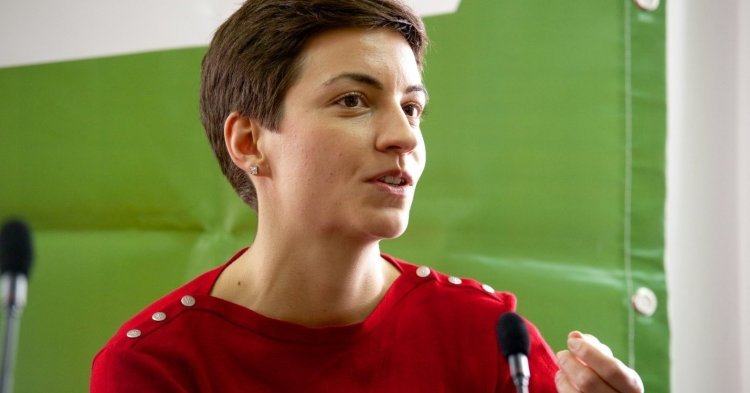You have embraced green politics since the age of 20 when you joined the youth organisation of the Bündnis 90/Die Grünen in your home country, Germany. What made you decide to get involved with the Greens?
For me was very clear that the Greens are the party that reflects my view on the world. After meeting some Green activists for the first time, I realised that they think in exactly the same way as I do, even though where I lived, in a small town, there were no Greens. Although I didn’t have exposure early on to the party, I soon realised that they are the political family that I belong to.
This is your third mandate as a Member of the European Parliament and you were elected for the first time in 2009. Have you always wanted to become an EU lawmaker?
I wasn’t born thinking that I should become an MEP! However, I was active in the European Young Greens for a long time, from 2002. So, I got involved with them quite early on and then I realised how important, interesting but also exciting the European sphere is. Working together with young people from all over Europe was more appealing to me than being active at the national or regional level.
What have been the most major contributions of the Greens/EFA group to the European Parliament of the past 11 years – the time you have been there?
We have achieved an amazing amount of things, because contrary to national politics, we’re not restricted to a government-opposition dynamic. If you’re in the opposition, you always lose and if you’re in government you have to make some compromises. In contrast, here in the European Parliament, they’re shifting majorities. You can always try to find a majority for your idea, for your project. And very often as Greens, we manage quite well. You might look at our numbers and think, what are they going to achieve? Actually, we’re achieving a lot, in many different areas. I, for example, have worked a lot on refugee rights for the last 10 years and we’ve really been able to make gains, even in difficult areas like Frontex. We managed to appoint a person responsible for compliance with fundamental rights, a complaint mechanism and a lot of safeguards. Then we have the topic of the climate; we’ve had a lot of wins on energy-saving and pesticides, for example.
After Brexit, the composition of the European Parliament will shift to the right, as the far-right Identity and Democracy will become the fourth-largest group while the Greens will be downgraded to the fifth position. What do you believe this change in the equilibrium of the EU political forces will mean for your group and the rest of the pro-European bloc?
Of course, symbolically there is a difference if the far right is the fourth biggest group and not the Greens any more. But it doesn’t change the fact that Identity and Democracy don’t have a majority and didn’t win as many seats in the last elections as they wanted. So, they don’t have so much influence at all and that’s not changed by Brexit. It makes a difference for the size of the group, but the political influence won’t change. It’s not like people will say, oh, well, let’s now work together with the far right.
One of your objectives is to involve young people more in the decision-making process. Could you explain to us what your concrete plan is to reach this goal? Do you think the Conference on the Future of Europe is the right time to give young people a greater chance of shaping the future of our continent?
We are looking forward to the Conference of Europe. It’s going to be great. However, it’s not the only and I would even say not the main place where young people can become involved. I think the voice of young people needs to be heard much more in politics both on the European and national level. In fact, in the end, any decision that we’re taking will affect most young people simply because they will be around much longer. Of course, this is exemplified by the climate crisis; if we don’t act now, it’s the young people who will suffer the most because the older ones will be gone. This applies to other policy areas too. The European Parliament has been getting better. We have more young people now than we used to have. I mean, when I got elected in 2009, it was very exotic to have someone below 30 in the Parliament! It’s become much more normal, but it’s still not enough. There’s still the stereotype of a politician which is a man, older and from a privileged background. But, in the end, a parliament, no matter which parliament, takes decisions for all of us. So, we need to make sure that society is represented, as I do think in order to have more of young people’s voices heard, we need to have them into decision-making bodies that exist. That means parliaments and no conference on anything can replace them.
In November, the Greens/EFA Group abstained from the vote on the new European Commission due to general disapproval within the political family on the appointment of some Commissioners. Almost two months on from that decision, is your position towards the new College of Commissioners unchanged? How does your group intend to cooperate with the new Commissioners, especially those dealing with fundamental issues for the Greens?
We abstained because we said we want to give this commission a chance. We don’t want to say no because they want to put much more emphasis on ecology, which is really good. Juncker also had strong points, but the environmental topics were not his strong point. So, we see a move in the right direction in the commission, but we really have no idea how far this will go. It’s one thing to have nice green headlines, but is this commission going to make proposals that actually do something in order to tackle the climate crisis? It’s still quite unclear because what has been proposed so far as the European Green Deal is basically a set of timelines and headlines, and the devil is always in the detail and that’s particularly true with environmental and climate policies. We were already quite disappointed that the commission doesn’t want to touch the agricultural and trade policy to tackle the climate crisis, so there we really have problems, but we’re working together very closely with the Commission President and also with a lot of the commissioners. We want to work towards our aims - climate justice, environmental improvement, social justice and so on - in a constructive manner.
Do you think young people can become climate activists regardless of their political belief? What is your message to them?
Yes, just do it and get involved! However, the Greens are the only party that has always been clear, consistent and coherent on the environment and climate issues. That’s very clear. Other parties are now also jumping on the bandwagon. That’s very good because we need majorities, but it’s very clear that the Greens are the only ones driving it. Of course, you can be in climate activist without being involved in party politics and it’s very good that the climate activists are pressurising all parties because in the end we need a majority. My advice would just be to get active, get involved, go into the decision-making bodies, make sure your ideas are being heard and make sure your vote counts.


Follow the comments: |
|
